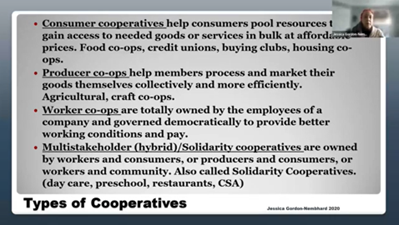Book Group Recap: Collective Courage with Dr. Jessica Gordon-Nembhard
Dr. Gordon-Nembhard defines a Cooperative for the DMV Community Book Group
Our quarterly DMV Community Book Group dove into the world of Cooperative Economics with Dr. Jessica Gordon-Nembhard, Professor at City University of New York and author of the book Collective Courage: The History of African American Economic Thought and Practice. The discussion was attended by a wide range of community partners including representatives from cooperatives across DC, Maryland, and Virginia.
“Cooperative economics is the origin of our economic system,” Dr. Gordon-Nembhard explained. “It’s a concept has played a vital role in nearly every population in human history – especially amongst African Americans and other people of color.”
Cooperatives have long played a significant role in African American communities within the Greater Washington region – one which Dr. Gordon-Nembhard is intimately familiar with. A long-time DC resident, Dr. Gordon-Nembhard is an active member of Organizing Neighborhood Equity (ONE) DC and is active in campaigns to establish cooperative housing in DC.
Dr. Gordon-Nembhard spent years researching the history and impact of African American economic cooperatives across the region and the country – documenting more than 160 legally incorporated African American-owned cooperatives from mid-1800s to 2013.
“As African Americans, we started using coops for survival – but overtime we were able to position them to control our own communities, both politically and economically.”
Dr. Gordon-Nembhard outlines the four different types of Economic Cooperatives.
Dr. Gordon-Nembhard explained how the Black Cooperative movement helped African American communities overcome challenging times including economic recessions in the 1880s and 1930s, as well as ongoing economic racial discrimination. She pointed out that the Black Cooperative Movement paralleled – and at times overlapped with the Long Civil Rights Movement, involving Civil Rights icons from across the spectrum such as Ella Jo Baker, W.E.B. DuBois, and the Black Panthers.
“Some people think that to close the racial wealth gap, we just need more wealthy people of color, so the wealth gap will close, based on numbers alone,” Dr. Gordon-Nembhard shared. “I’m more interested in ending poverty – creating stable, lasting systems that enable us to all be prosperous.”
“That’s what cooperative economics are about – creating collective enterprises that not only impact individual lives, but that systematically change how we think about getting out of poverty.”
When asked about the future of the cooperative movement, Dr. Gordon-Nembhard pointed to the growing number of cooperatives over the past few years. For example, the DC region has one of the highest concentrations of housing coops in the US (second only to New York).
“Figure out what’s the need that a cooperative could solve and then take time to study out what kind of cooperative could work for your community.”
“Start where the people are,” she said. “Rather than scaling something big from the top down, start small with something people can get behind – a community playground or food coop and build from there.”
“Once you get people working together – maximizing the skills that each individual has and brings to the table – then you can move onto something bigger.”



